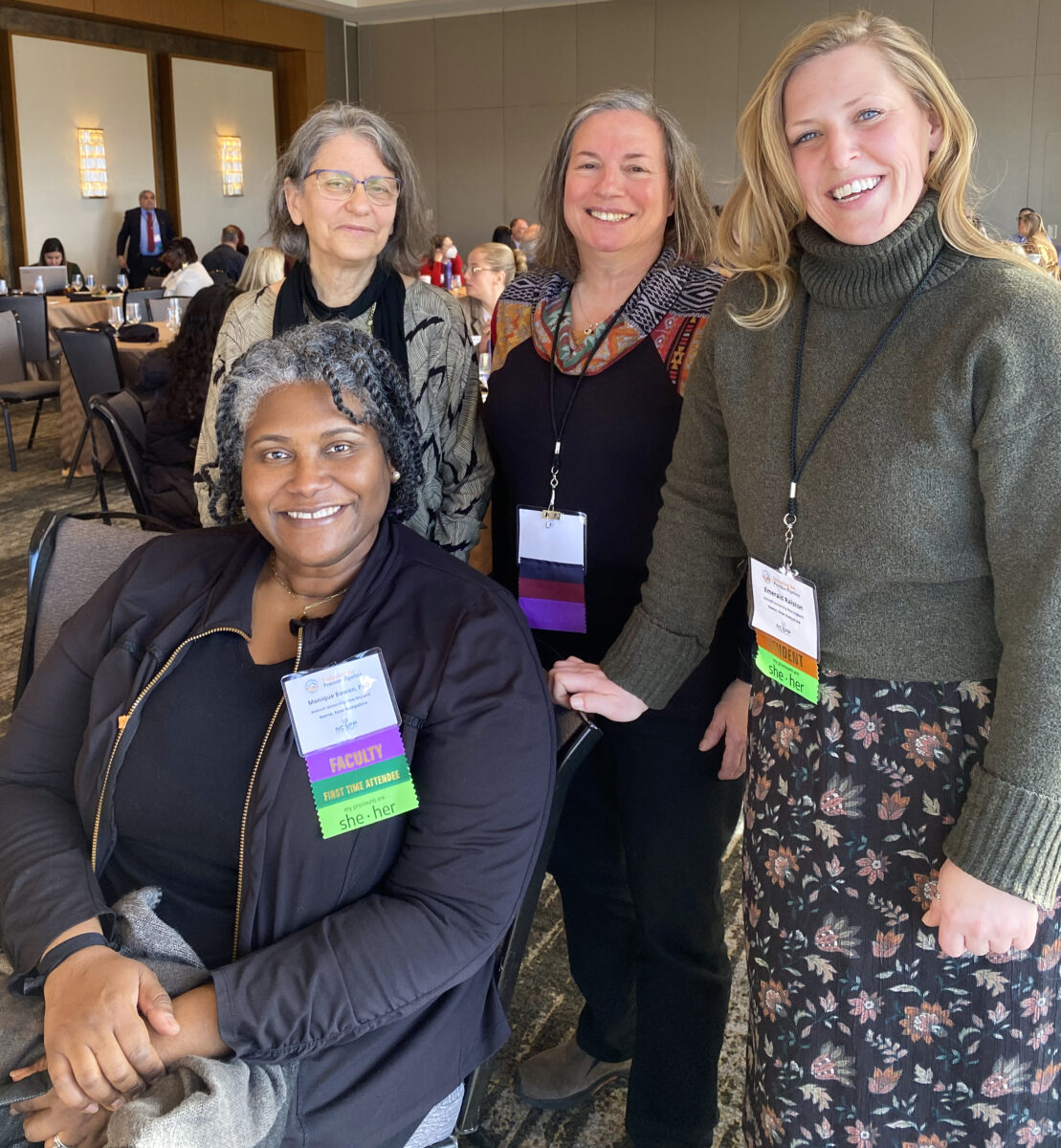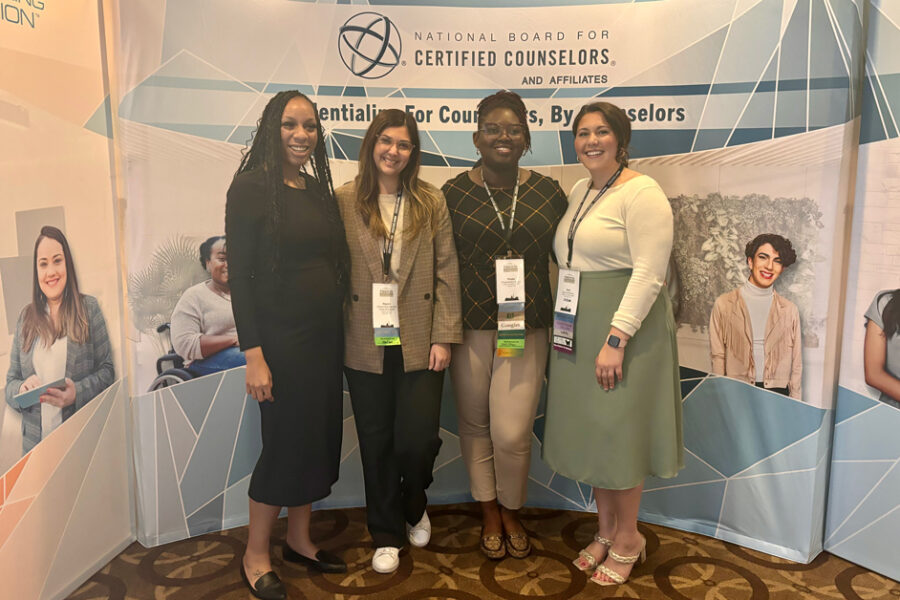The PsyD programs based on Antioch’s New England and Seattle campuses sent six faculty and one student to the midwinter conference of the National Council of Schools and Programs of Professional Psychology (NCSPP), the premier conference for professional psychological training programs. The conference was held on January 15-18 in Denver, Colorado. In a special honor, third-year doctoral student Emerald Ralston was one of only six student delegates chosen to attend the conference nationwide.
“It was an honor to be selected as Antioch’s student delegate for NCSPP,” says Ralston. “As one of only six delegates selected nationwide, it was an excellent experience to connect with the other delegates, as well as faculty members from clinical psychology departments throughout the country.”
The core faculty members included Seattle PsyD chair Jude Bergkamp, who is currently serving as President-Elect of NCSPP; New England faculty members Kathi Borden, Lorraine Mangione, and Monique Bowen; and Seattle faculty members Steve Curtis and Cheryl Azlin.
The conference offered a chance for peers around the country to network and discuss pressing topics. As Mangione explains, “NCSPP pulls together some of the best minds and hearts in clinical training and offers us a very collegial environment to grow and learn.”
A Conference Themed Around Advocacy and Training
The yearly NCSPP midwinter conference provided an opportunity for faculty, administrators, and students to come together through poster presentations, workshops, and panel discussions on professional development and training standards in clinical psychology. This year’s topic was “Evaluating the Provider Pipeline.” Events and presentations revolved around the mental healthcare shortage and the necessity for services across the country.
As Ralston explains, “The conference focused on diversity and how to increase equity in clinical psychology programs.” For student delegates, this was a professionalizing experience. She says, “It was interesting to see how information is presented and how faculty respond to issues of diversity, allyship, and overcoming barriers to inclusion.”
For faculty, the conference offered a chance to network with peers, learn the latest best practices, and also share their own research. Mangione and Borden, along with five faculty from other institutions, presented “Expanding the Pipeline: Encouraging Systemic-Level Impact Through Advocacy, Leadership, and Management Careers.” All of the presenters had connections to Antioch, with four being graduates of the PsyD and a fifth being a practicum supervisor for the program.
This presentation paid particular attention to the need for leadership and management positions within professional psychology. While the presenters noted the need for continuing to train students in direct care, they also highlighted the importance of training students on the systemic level in roles of leadership, management, and advocacy in order to bring about change in the mental healthcare system on a larger scale. Due to the shortage of resources, presenters argued the necessity for professional training in psychology to include multiple roles in order to meet the simultaneous needs of direct services and systemic reform. The presentation had initially been proposed as a workshop for a subset of attendees, but the organizers asked that they present it to the whole group because it fit so well with the conference theme.
For Mangione, the presentation felt highly successful. She explains that she and Borden “really wanted to stress the importance of psychologists at the systemic level of change and leadership, and I think we and our co-presenters were able to do that in a very engaging way.”
Bergkamp, meanwhile, delivered an address kicking off the NCSPP Day of Service. He gave presentations on “Instilling Intellectual and Cultural Humility in Doctoral Psychology Students: Successes and Failures of Three Doctoral Programs” and “Reaffirming and Revising of the NCSPP Model of Training,” each with co-presenters. He also helped lead an interactive Accreditation Support Meeting and led a session of the Ethnic and Racial Diversity Committee. Curtis presented on prescription privileges.

Inspiring Future Generations of Professional Psychology
Every NCSPP mid-winter conference, the organization invites psychology graduate students from eight institutions to apply to serve as student delegates at the conference. This honor, which Ralston received, also comes with obligations. Instead of presenting research, she explains, each delegate was asked to “present each day of the conference on our experience as delegates, and on the final day, we sat on a panel, giving faculty members a chance to ask us questions and gain insight into the student perspective.”
“The panel presentation was a rewarding experience,” says Ralston, “as it showed that the faculty really do care about the experiences of students in these programs, and empowered me to use my voice more to speak up about barriers to inclusion and inspired me to help empower others to do the same.”
Prioritizing Diversity, Thoughtfully
For Bowen, who has attended previous mid-winter meetings remotely, this year marked her first in-person opportunity which came courtesy of an NCSPP Diversity Scholarship Award. These scholarships are intended for faculty with a demonstrated commitment to promoting diversity that otherwise would not be able to attend. Bowen, an inaugural faculty chair of Antioch University’s Anti-Racism Task Force, says that this scholarship was a good and timely opportunity for re-engagement following her recent one-year sabbatical.
She says that the conference offered an opportunity to reflect on antiracism goals and diversity initiatives with peers across the delegate programs in attendance. She says, “From my vantage point as a mid-career professional, several of the Mid-Winter conference sessions helped further contextualize my experiences as a Black woman with a disability in academia while also framing the future-oriented work that needs to be done to deliver on the commitments to equity promised by educational institutions over the past many years.”
Bowen also notes that her participation as a scholarship awardee was made simpler, in some ways, by the decision of the selection committee not to announce the scholarship recipients during the conference. This allowed her to attend as faculty from a delegate program without, as she puts it, “a halo surrounding my presence.” She says, “The Executive Committee’s intentionality allowed me to attend without the performative expectations that can come with being spotlighted not for simply being a new person in the room but having one’s expenses paid.”
Beyond taking advantage of opportunities to network and develop professionally, Bowen used the conference as an opportunity to reflect on Antioch’s long history of helping develop the training model for, and serving in leadership roles with NCSPP. She notes Bergkamp’s leadership carries on this tradition: “Given the iterative, ongoing self-evaluation processes that training programs in professional psychology engage in on a regular basis, we [NCSPP delegate schools and programs] are fortunate to have Jude’s particular experiences as a scholar-practitioner and an antiracist leader to lean on for continued direction in the coming years.”




